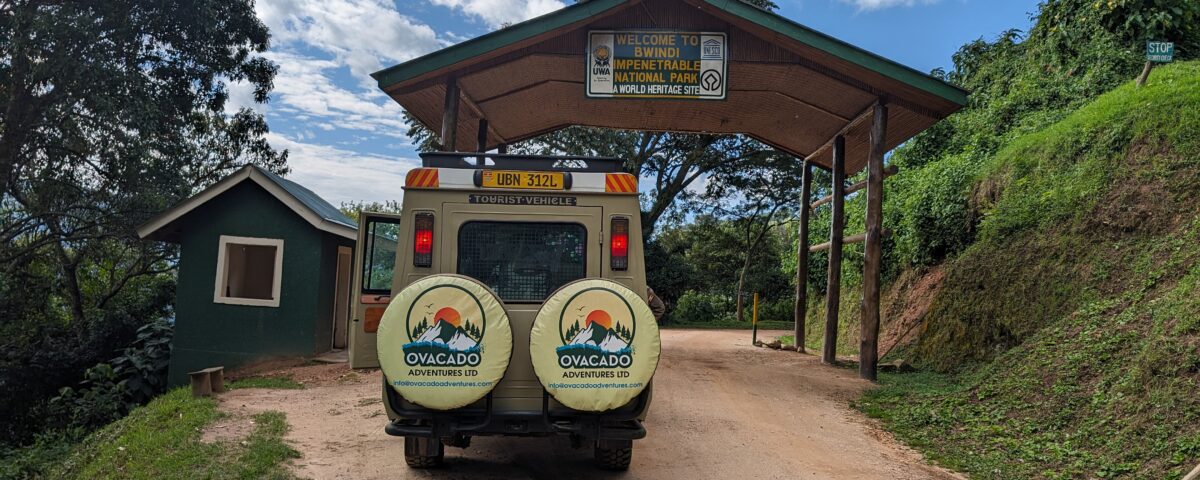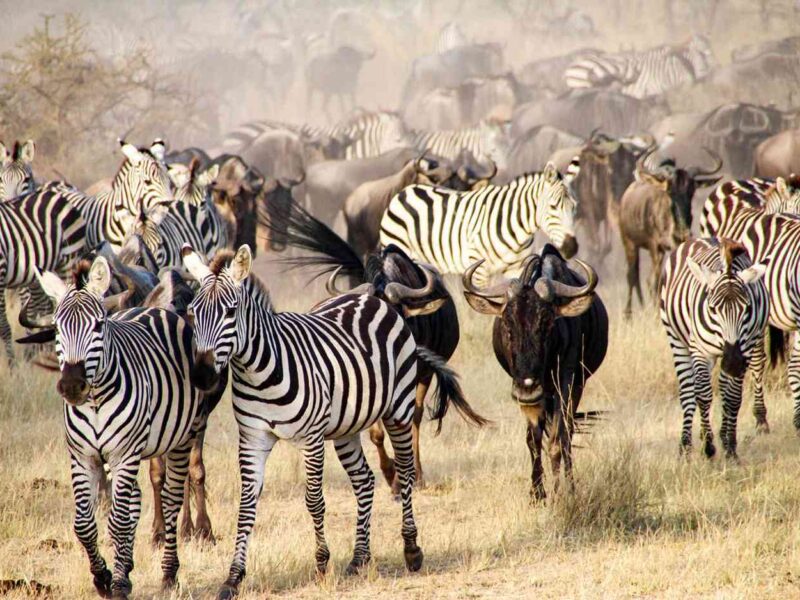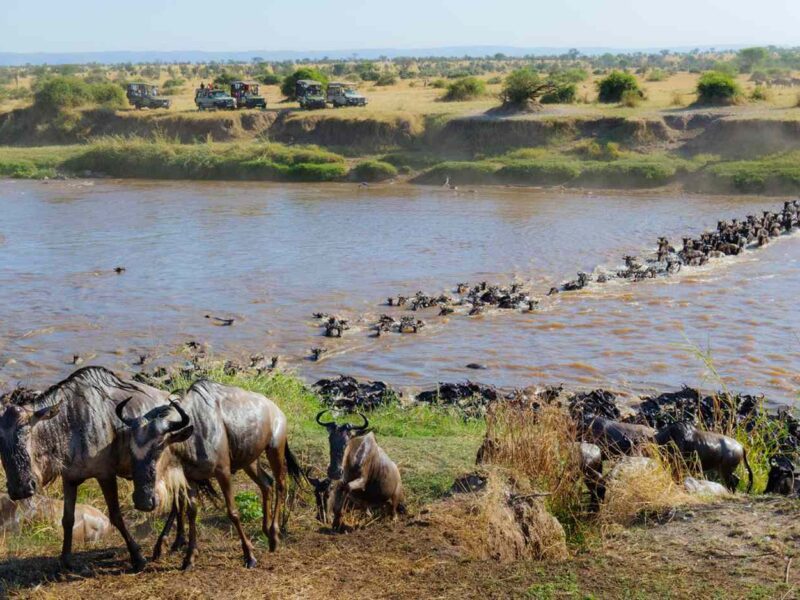
Chimpanzee Tracking in Uganda
September 1, 2024Chimpanzee Tracking in Uganda: Experience Chimpanzee Habituation: An Unforgettable Journey into the Wild
Uganda, a land of incredible biodiversity, offers one of the most unique wildlife experiences in the world: chimpanzee habituation. This extraordinary adventure allows wildlife enthusiasts and eco-tourists to immerse themselves in the daily lives of our closest animal relatives, the chimpanzees. Unlike typical safari experiences, chimpanzee habituation provides a deeper, more intimate connection with these fascinating creatures, allowing visitors to observe and understand their natural behaviors up close. Whether you’re a seasoned wildlife enthusiast or a curious traveler, this experience is designed to be both memorable and educational, with a strong emphasis on conservation and ethical tourism.
Understanding Chimpanzee Habituation
Chimpanzee habituation is the process of gradually acclimatizing wild chimpanzees to the presence of humans. This process is crucial for various purposes, including research, conservation, and eco-tourism. Unlike chimpanzee rehabilitation, which focuses on preparing captive chimpanzees for release into the wild, habituation involves wild chimpanzees in their natural habitat. The goal is to allow scientists, conservationists, and tourists to observe these primates without causing them undue stress or altering their natural behavior.
Chimpanzee habituation experiences offer a rare opportunity to witness the intricate social structures and behaviors of these primates. However, it is essential that these activities are conducted with a strong commitment to ethics and sustainability, ensuring that the welfare of the chimpanzees and the integrity of their environment are preserved.
The Purpose of Chimpanzee Habituation
The primary purpose of chimpanzee habituation is to enable humans to observe these primates in their natural habitat without causing disruption. This process is vital for several reasons:
- Scientific Research: One of the main reasons for habituating chimpanzees is to facilitate in-depth scientific research. Researchers can study the behavior, social dynamics, and ecology of these primates more effectively when the chimpanzees are accustomed to human presence. This research is crucial for understanding the complex lives of chimpanzees and for developing strategies to protect them.
- Conservation: Chimpanzee habituation plays a significant role in conservation efforts. By allowing humans to observe these animals up close, it helps raise awareness about the threats they face, such as habitat loss, poaching, and disease. The insights gained from habituation can inform conservation strategies and policies aimed at preserving chimpanzee populations and their habitats.
- Eco-Tourism: In some regions, chimpanzee habituation has become a popular eco-tourism activity. Guided treks through the forests allow tourists to observe habituated chimpanzee groups in their natural environment. This not only provides an unforgettable wildlife experience but also generates revenue that can be reinvested in conservation efforts and local communities.
The Duration of Chimpanzee Habituation
The process of habituating chimpanzees is a time-consuming and delicate task that requires patience and consistency. The duration of habituation can vary widely depending on several factors:
- Chimpanzee Temperament: The temperament of the chimpanzee group plays a crucial role in the length of the habituation process. Some groups may be naturally more tolerant of human presence, leading to a quicker habituation process. Others may be more cautious or fearful, requiring a longer period to become accustomed to humans.
- Frequency of Human Interaction: The frequency and consistency of human visits to the chimpanzee group are also important. Regular, positive interactions can accelerate the habituation process, while infrequent or inconsistent visits may prolong it.
- Environmental Conditions: The specific conditions of the chimpanzees’ natural habitat, including the availability of food and the presence of other animals, can also influence the habituation timeline.
In some cases, chimpanzee habituation can be completed in a matter of months. However, more often, it takes several years, especially if the welfare of the chimpanzees and the preservation of their natural behavior are prioritized. The gradual approach ensures that the chimpanzees do not feel threatened and that their natural activities are not disrupted.
Chimpanzee Habituation in Kibale Forest National Park
Kibale Forest National Park, located in southwestern Uganda, is one of the most important sites for chimpanzee habituation in Africa. This lush forest is home to one of the highest concentrations of chimpanzees in the world, making it an ideal location for both research and eco-tourism. The park’s rich biodiversity, including over 13 species of primates, has made it a focal point for conservation efforts and a prime destination for wildlife enthusiasts.
- Research and Observation: Kibale Forest has been the site of extensive chimpanzee research for several decades. Researchers from around the world come to this park to study the behavior, social structures, and ecology of chimpanzees. The habituation process in Kibale is designed to allow scientists to observe these animals up close, providing invaluable data that contributes to the global understanding of chimpanzees.
- Eco-Tourism: The habituation efforts in Kibale have also made it a popular destination for eco-tourists. Guided treks through the forest offer visitors the chance to observe habituated chimpanzee groups in their natural habitat. This experience is not only educational but also supports conservation efforts by generating revenue that funds park management and local community projects.
- Conservation and Protection: The long-term habituation of chimpanzees in Kibale has also contributed to their conservation. By familiarizing chimpanzees with human presence, it reduces the likelihood of negative interactions between humans and chimpanzees, such as poaching or habitat encroachment. The success of Kibale’s habituation efforts has made it a model for similar programs in other parts of Africa.
Chimpanzee Habituation in Rwanda: Nyungwe Forest National Park
While Rwanda is primarily known for its successful mountain gorilla conservation efforts, it is also home to a growing interest in chimpanzee habituation, particularly in Nyungwe Forest National Park. This park, located in the southwestern part of the country, is one of the largest and most ancient rainforests in Africa, offering a unique environment for chimpanzee habituation.
- Nyungwe Forest National Park: Nyungwe Forest is renowned for its rich biodiversity, including a large population of chimpanzees. The park’s dense canopy and diverse flora provide an ideal habitat for these primates, making it a prime location for habituation efforts.
- Chimpanzee Habituation and Research: The primary focus of chimpanzee habituation in Nyungwe is research and conservation. Researchers are keen to study the behavior and social dynamics of chimpanzees in this unique environment. The data collected from these studies contributes to a broader understanding of chimpanzee ecology and informs conservation strategies in the region.
- Eco-Tourism Potential: While chimpanzee habituation in Rwanda is not as well-known as gorilla tourism, it is gaining momentum. Nyungwe Forest offers tourists a unique opportunity to observe habituated chimpanzees in one of the most pristine rainforests in Africa. This experience not only enhances Rwanda’s eco-tourism offerings but also supports conservation efforts by generating much-needed revenue for the park.
Ethical Considerations in Chimpanzee Habituation
Chimpanzee habituation, while beneficial for research, conservation, and eco-tourism, must be conducted with a strong focus on ethics and sustainability. The welfare of the chimpanzees and the preservation of their natural behavior should always be the top priority.
- Minimal Impact on Chimpanzees: Habituation should be carried out in a way that minimizes stress and disruption to the chimpanzees. This includes limiting the number of human interactions and ensuring that the chimpanzees’ natural behaviors are not altered.
- Respecting Natural Habitats: The conservation of the chimpanzees’ natural habitat is crucial. Habituation efforts should be accompanied by initiatives to protect and restore the forests and ecosystems that the chimpanzees depend on.
- Community Involvement: Engaging local communities in habituation and conservation efforts is essential for their success. By involving communities in eco-tourism and conservation activities, it ensures that they benefit from these efforts and are motivated to protect the chimpanzees and their habitats.
- Regulations and Guidelines: Proper regulations and guidelines should be in place to govern chimpanzee habituation activities. These should include limits on the number of tourists, the duration of visits, and the proximity allowed during observations.
Conclusion: An Unforgettable Wildlife Experience
Chimpanzee habituation in Uganda and Rwanda offers an unparalleled opportunity to connect with one of our closest animal relatives in their natural environment. Whether in the dense forests of Kibale or the lush rainforests of Nyungwe, this experience provides a deep and meaningful connection with the natural world. As you walk through the forests, guided by expert trackers and researchers, you will witness the complex social structures and behaviors of chimpanzees, gaining a new appreciation for these remarkable animals.
By participating in chimpanzee habituation, you are not only creating unforgettable memories but also contributing to the conservation of these endangered primates. This experience is a powerful reminder of the importance of protecting our planet’s biodiversity and the incredible creatures that share it with us.
East Africa Holidays
- 10 Days Tanzania Walking Safari
- 10 Days Uganda Rwanda Safari
- 11 Days Karibu Kenya Private Safari
- 12 Days Uganda Rwanda Group Safari
- 13 Days Kenya Rwanda Safari Holiday
- 13 Days Uganda Rwanda and Burundi Safari
- 14 Days Rwanda Uganda Adventure
- 4 Days Kenya Wildlife Safari
- 4 Days Tanzania Wildlife Tour
- 5 Days Tanzania Big 5 Safari Holiday
- 6 Days Great Migration Tanzania
- 6 Days Rwanda Uganda Safari





